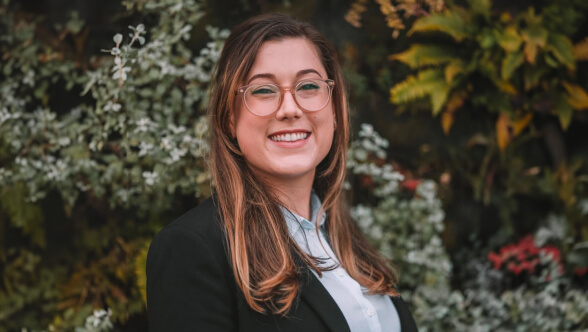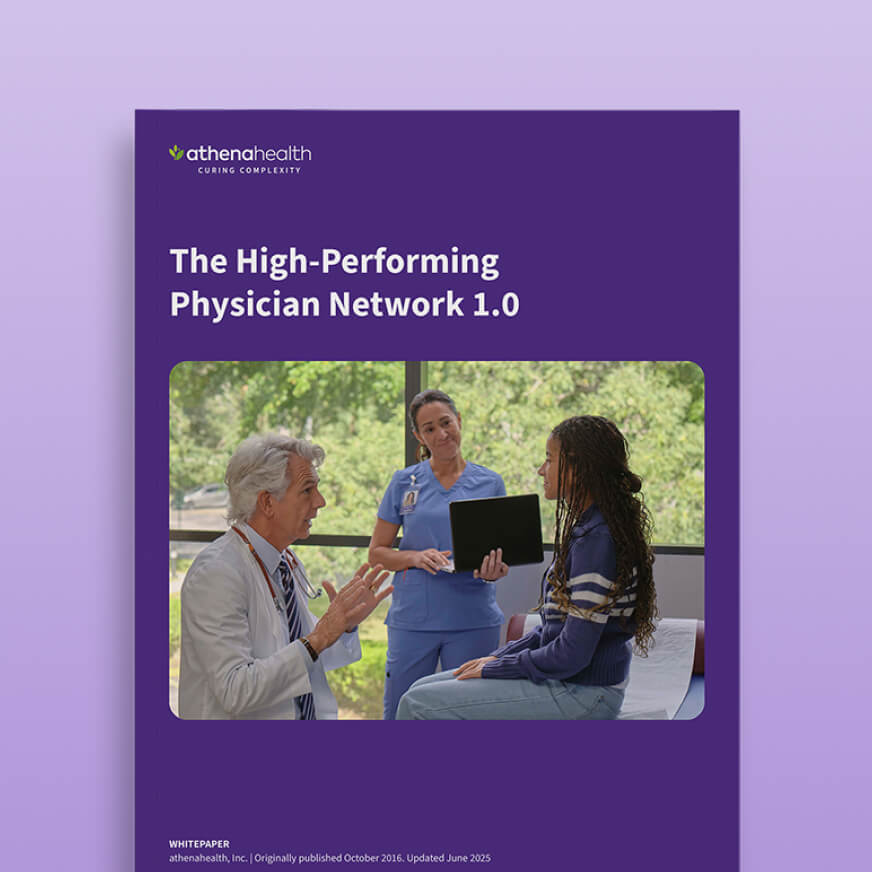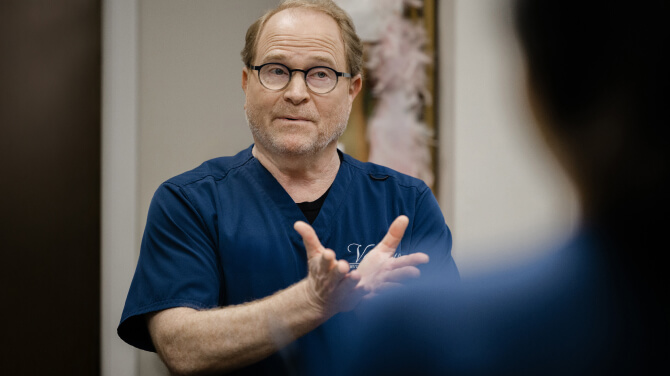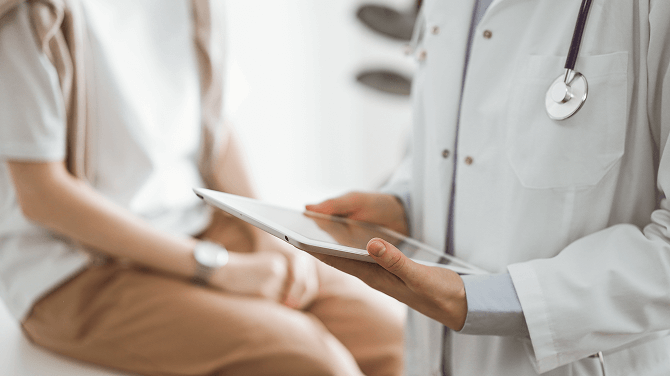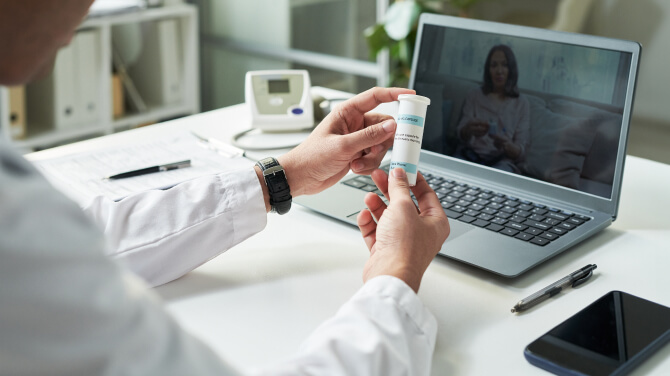Data shows optimism and adoption of AI in healthcare continue to grow, but concerns around loss of human touch persist
Artificial intelligence (AI) has firmly established itself in the healthcare industry, with more than 9 in 10 (94%) physicians now aware of its application in their field. As data from our 2025 Physician Sentiment Survey shows, year-over-year awareness continues to increase, with clinical documentation and ambient notetaking listed as the use cases with the most growth among clinicians today. This follows a clear trend, considering data from last year’s survey highlighted an urgent need to reduce the administrative burden on physicians and give them more time back in their day.
Looking more closely at the use of AI among physicians, the adoption curve shows a clear demographic pattern: younger clinicians under 40, and those in medium to large healthcare organizations (11 physicians or more), have emerged as the “power users” driving forward the exploration and integration of this technology.
Yet amid this rapid digital transformation, certain concerns persist about preserving the essential human connection in medicine. Even as generative, agentic, and predictive AI continue to transform healthcare delivery, thoughtful implementation of this technology, whether through AI tools or AI-native electronic health records (EHRs), remains critical to ensure it enhances, rather than diminishes, the physician-patient relationship.
In order to further understand these benefits and concerns, let’s dive a bit deeper into the results of our survey.
Over a third (38%) of physicians said they’re hopeful that new technology (AI) will reduce administrative burden, and 37% said they’re hopeful that it will improve patient diagnosis and care. But these percentages jump to 53% and 47% respectively among physicians at practices already using AI.
Clinicians feel increased optimism around the integration of AI in healthcare
In about a year, sentiment about AI in healthcare has shifted from skepticism to optimism. In a significant change from last year’s survey, physicians’ concerns that AI will be one more thing that will complicate healthcare decreased from 42% in 2024 down to 31% in 2025. Additionally, their worries about this technology being overhyped have decreased from 40% last year to less than a third (27%) this year. This data shows clearly that physicians across the nation are becoming more comfortable with the presence of AI in the industry.
Additionally, over a third (38%) of physicians said they’re hopeful about the benefits of AI in healthcare—that new technology (AI) will reduce administrative burden, and 37% said they’re hopeful that it will improve patient diagnosis and care. But these percentages jump to 53% and 47% respectively among physicians at practices that are already using AI. This could mean that the clinicians who are familiar with, and are already using AI EHRs see the potential. Early adopters are beginning to note the benefits of allowing this technology to take on day-to-day manual tasks like chart prepping and can see the future benefits of gaining time back in to focus on patient care.
While physician burnout is one of the greatest and most persistent challenges in healthcare, advancements in healthcare technology and automation are becoming part of the solution. Instead of doctors spending their evenings completing progress notes in order to get reimbursed, AI is helping automate documentation and compliance tracking. AI in revenue cycle management can also take on the process of navigating a maze of insurance policies and prior authorizations, helping automate these steps so that patients can receive timely care.
The biggest benefits? Clinical documentation and ambient notetaking show clear growth above the rest
Among physicians who are already using artificial intelligence in their practice, 68% reported their use of AI for generating clinical documentation increased, a strong indicator that this use case is a popular one for those familiar with the technology.
However, only 36% of physicians reported that their use increased for administrative tasks. This is certainly a focal point for future improvement, since this is an area where AI can provide significant value. Medical billing, insurance claims, compliance requirements, and record-keeping create a mountain of administrative work, but AI EHRs can help ease this load by automating redundant tasks, improving data accuracy, and streamlining clinical workflows. While adoption has grown for clinical documentation and ambient notetaking, the data suggests there’s still substantial opportunity to reduce the daily administrative strain on physicians.
On the opposing side, the AI use cases that physicians say they’re least comfortable with are diagnosis support (59%), patient portal communications (56%), and treatment planning (47%). AI has shown promise in pattern recognition, such as spotting anomalies in x-rays and imaging, and identifying trends in patient data, but it remains unclear how physicians in the coming years will collaborate with and help train the technology in the future.1
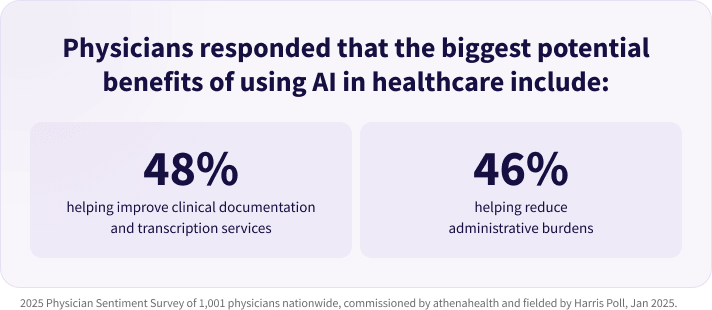
AI sentiment shifts with demographic differences in age and geographic locations
While familiarity with AI may be lower among older physicians, that doesn’t mean they’re less likely to see potential benefits. In fact, physicians aged 65 or older are more likely to believe AI can help with pattern analysis and diagnosis support than their younger counterparts. Nearly two thirds (64%) of physicians 65+ see identifying patterns and anomalies in patient data that a physician might miss as a core benefit, compared to just 43% of physicians 64 and younger.
That said, younger physicians (those under age 40) are more likely than their older counterparts to acknowledge the efficiency and administrative advantages of AI. Over half (58%) of younger physicians see streamlined administrative tasks as a key improvement compared to just 43% of older physicians. Similarly, younger physicians are more likely to view increased healthcare efficiencies (54%) and reduced physician burnout (45%) as core benefits, compared to just 37% and 28% respectively for older clinicians.
When we look at the nuances between geographic locations, our data shows that more physicians in urban areas believe that artificial intelligence will have a positive impact on the quality of patient care (43%) and reducing the overall cost of patient care (36%) compared to those in suburban areas (32% and 26%).
Additionally, physicians in rural areas are more likely than those in suburban areas to believe AI will have a positive impact on freeing up provider and administrative resources (63% vs. 47%). Rural physicians often face significant administrative challenges due to limited staff and resources. They may be more receptive to the potential for AI in patient engagement, from intelligent text messaging to automated wait lists.
Loss of human touch still a top concern
Despite the positive shifts in sentiment with this year’s survey, physicians still expressed some reservations, with their primary concerns remaining consistent year-over-year. Notably, 61% of physicians worry about the potential loss of human touch in patient care, while 58% fear an overreliance on artificial intelligence for diagnostic purposes, which could lead to potential inaccuracies and issues with patient care down the line. The athenaOne AI-native EHR is designed to make care more personal, not more mechanical, by removing friction from the clinician’s day. Automating routine tasks, delivering personalized insights, and safeguarding data privacy are all designed to build deep clinician trust and enable truly patient-centered care.
Where data can make a difference
With AI in healthcare already changing the way that clinicians at practices—across size and geographic location—are managing their time and daily tasks, practice managers should leverage this data to discover where implementation will drive the most impact.
Data-backed AI use cases like clinical documentation and ambient notetaking can help alleviate the administrative burden for understaffed practices and burnt-out physicians. These tools can make a meaningful difference, especially when clinicians start seeing the benefits of AI helping reclaim time to focus on patient care. Thoughtful, intentional implementation of incremental healthcare technology improvements, such as these AI features, help empower physicians to do what they do best.
To discover more about how AI is influencing healthcare today, and how physicians' views on this technology have shifted, read the full 2025 Physician Sentiment Survey report.
More athenaInstitute resources
Continue exploring
1. MGMA. (Jan 3, 2024). Artificial intelligence in diagnosing medical conditions and impact on healthcare. Retrieved April 2025, from https://www.mgma.com/articles/artificial-intelligence-in-diagnosing-medical-conditions-and-impact-on-healthcare
Except where separately noted, all metrics are sourced from:
2025 Physician Sentiment Survey of 1,001 physicians nationwide, commissioned by athenahealth and fielded by Harris Poll, Jan 2025.
2024 Physician Sentiment Survey of 1,003 physicians nationwide, commissioned by athenahealth and fielded by Harris Poll.





